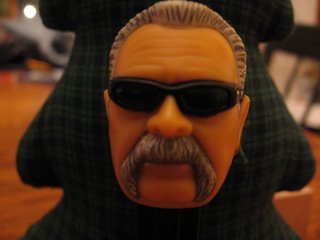Hall of Fame PReview, Part 5
Now that the voting is in and Andre Dawson has been elected, it's time for me to continue my review of this year's candidates. Since we already know how the voting turned out, I'm going to sort of start from the bottom and work my way up.
Harold Baines – OF (1980-2001, primarily with the Chicago White Sox): 289/356/365-384-1,628, 120 OPS+. A good hitter, especially in the first part of his career with Chicago, Baines' candidacy is sunk by the fact that he played in about 60% of his games as the Designated Hitter. Made six all star games, including the 1999 classic at age 40, a season in which he posted a 135 OPS+. Won't make the Hall, because his very good hitting comes with zero defensive contribution. A handful of Hall of Famers on his career comps, including Tony Perez, Al Kaline, Billy Williams, Jim Rice and Dawson. All but Kaline are fairly marginal members of the Hall.
Dale Murphy – CF (1976-1993, primarily with Atlanta): 265/346/469-398-1,266, 121 OPS+. The classic example of prematurely labelling a player as a "sure-fire Hall of Famer" mid-career. At age 31, Dale Murphy was a sure-fire Hall of Famer. Two MVP's, seven all star appearances, five gold gloves, and 310 career home runs - well on his way to 500 for his career. Then it all stopped. Murphy only hit above .250 once more in his career (.252), never again hit more than 24 HRs in a season, never again knocked in more than 84 runs, never made another all star game, and he was finished at age 37. Murphy only has one Hall of Famer on his career comp list, and not a particularly strong one in Duke Snider.
Dave Parker – OF (1973-1991, primarily with the Pittsburgh): 290/339/471-339-1,493, 121 OPS+. Like Murphy, Parker was a monster at the beginning of his career. Through age 27, Parker was a perennial MVP candidate with one already under his belt, along with three gold gloves and two all star games. Then he found the drugs, and the drugs didn't like his game. He made a couple more all star teams the next couple of seasons, but went five years with sub-800 OPS. Then he came back with a huge year at age 34 with the Reds (.312-34-125, second in the MVP vote) and followed up with another almost as impressive. Parker hung around as a decent bat for a few more years, but is one of the great "Coulda Beens" of the last 30 years. Top career comp is Luis Gonzalez, with HOFers Perez, Billy Williams and Dawson (along with Baines) rounding out the top 5.
Don Mattingly – 1B (1982-1995, Yankees): 307/358/471-222-1,099, 127 OPS+. Stop me if you've heard this one before: Mattingly was one of the best players in the majors his first few seasons in the big leagues. At age 28 he was a lifetime .323 hitter with a 144 OPS+, had one batting title and one MVP to his name, and was already a six-time all star and five-time Gold Glove winner. Then he had a back injury that sapped him of his power for the rest of his career. Mattingly remained a solid fielder, and his supporters point to his 10 total Gold Gloves as a prime consideration for his inclusion in the hall. But the bottom line is that first basemen get into the Hall of Fame by hitting home runs, and 222 is just too low a number to warrant inclusion. It doesn't help that his career fit neatly between the perennial Yankee playoff teams of the 1970's and 1990's. Mattingly's injuries and shortish career leave him outside looking in at the Hall of Fame.
Labels: Hall of Fame

